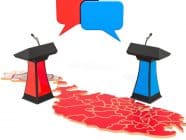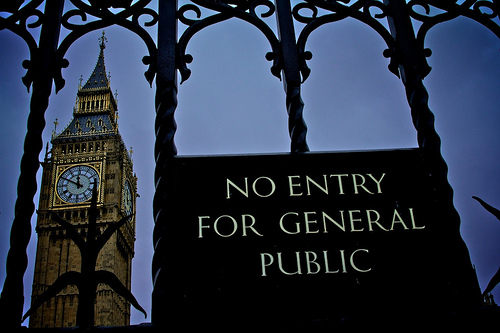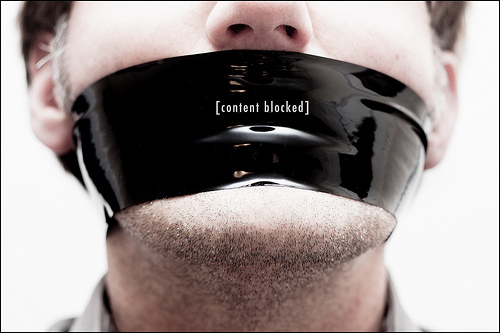Most MPs in the Czech Republic believe the media undermines trust in politics and almost half believe the media has a negative impact upon democracy.
Politicians also think that many journalists are more interested in expressing their own political opinions, or reporting political in-fighting, than covering policies in detail.
Almost 80% of the politicians surveyed believe journalists decide which political topics are of the highest priority, and most (75%) are convinced that political policies are created by the media.
Despite these beliefs, Czech politicians consider their relationships with journalists to be mostly harmonious or neutral.
These findings are from a recent study: Attitudes of Czech Politicians to the Media and the Quality of Journalism, conducted by the researchers of the Institute of Communication Studies and Journalism, at Charles University in Prague.
The main research objective was to find out what power politicians ascribe to the media, what they think about the functioning of the media and their role in democratic society, and how they would describe their relationships with journalists. All of these are among the factors that influence the way politicians relate to the media, and how journalists treat politicians.
The survey included 110 members of the Czech Parliament (82 MPs and 28 Senators), across all political parties.
Television “most powerful”
The research findings indicate that Czech politicians are convinced the media has a significant impact on politics. They believe public service television is the most powerful, (75% respondents consider its influence high); next is commercial television (60%); then quality newspapers (52%); tabloid newspapers (49%) and online media (41%).
Approximately one third of the respondents believe that social media platforms, such as Facebook and Twitter, have a strong impact on politics.
The media has a negative impact on democracy
This notion of the media’s power is accompanied by the belief that the activities of the media have a negative impact on society.
Almost one half of the MPs and Senators questioned feel that the media has a negative impact on democracy (only 13% of the politicians believe the opposite). Most, 80%, of the respondents state that the media undermines trust in political leaders and 72% also think the media undermines trust in the political system as a whole.
According to the majority of the politicians (77%), political journalism is governed by the demand to deliver information in a quick way and with the widest possible reach (91%). Almost 60% of the politicians believe that at attempt to express their own personal opinion on politics is an important motivation for political journalists.
In recent years, the majority of coverage of political events in the media has been increasingly negative, according to 85% of the respondents. A similarly large group is convinced that the media increasingly focus on various political tactics (who is going to vote with who, who is against who etc) instead of providing information about the substance of politics. This is linked to the opinion of two thirds of MPs and Senators who believe that the coverage of complex, comprehensive topics in the media is decreasing.
Relationships with journalists are “harmonious” and professional
Regardless of this criticism, politicians see their relationships with journalists as mainly harmonious and professional. (53% of the respondents called their relationships with journalists as “rather harmonious” or “very harmonious”, 41% called them neutral and 5% considered them as “rather conflicted”; no respondents considered their relationships with journalists as “strong conflict”).
It is not common for politicians to have many journalist friends (45% of respondents do not consider any journalist to be their personal friend; 43% have 1–5 friends among journalists). If a conflict emerges between politicians and journalists, the politicians mostly believe that the reason is misinterpretation of information by the journalists.
The last area of research was the attitude towards social media, primarily, to Facebook and Twitter. Although these media have a smaller impact on politics compared to other platforms, 90% of politicians still consider social media an essential part of political campaigns, and more than 80% believe social media are an area of interest for any politician.
Social media’s impact is perceived to be its ability to bypass traditional media, although a slight majority of the politicians believe that social media can also bring politics closer to citizens. Facebook is slightly more important for politicians as a means to communicate with their voters; Twitter is more for connecting with journalists.
Parallels to South Europe
This survey was largely inspired by similar research, entitled Political Communication Cultures in Western Europe carried out recently in nine European countries (Germany, Austria, Switzerland, Finland, Sweden, Denmark, France, Spain and Slovenia).
In the international context, the prevailingly negative perception of the impact of the media on democracy among Czech politicians is comparable with the opinions of their colleagues from Austria, Germany or France; in other countries, the media are perceived in a more positive way.
In a number of aspects, Czech politicians hold the same opinion as their colleagues from the South of Europe. Czech MPs and Senators are exceptional in their belief that the media are able to highlight topics which are significant to society. 79% of Czech politicians consider this ability a strong one compared to only 39-59% of politicians from other countries where similar research took place (the most in Spain, the least in Germany).
pic credit: Flickr: Phil Schatz
Tags: Blesk, Czech Republic, Journalism research, media and politics, Media research












































